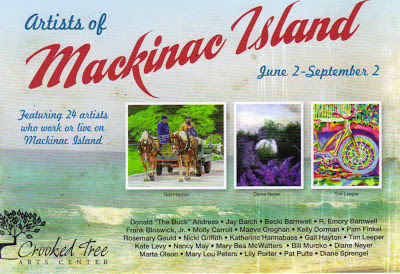Time goes by so quickly, it's easy to forget just how much you've accomplished. So here's a look back at my 2012 projects, large and small.
A major project was my submission for the annual Manoogian Art Museum juried competition, the theme was Grand Hotel. I spent a full six months creating a three dimensional, life sized white pine stump, as Grand was built of white pine and originally used some of the stumps as the foundation (I was able to view a couple that are still under the hotel).
Not only was "The Foundation or In the Beginning" accepted into the show - it won Best of Show!
In the fall, it also was accepted into the Northern Exposure show at the William Bonifas Fine Arts Center; only artists living in Michigan's Upper Peninsula are allowed to enter.
Crooked Tree Arts Center in Petoskey, Michigan hosted a fabulous show featuring 24 Mackinac Island artists.
The curator chose several of my pieces, even a couple that were still in progress! I was also asked to participate in their "Coffee at Ten" lecture series; it was a wonderful opportunity to discuss how my beadwork started as an effort to recreate the past and the unexpected directions it seems to be going in - where's it going next?
"Cycling" , a large mixed media sculpture was accepted into the New Fibers '12 juried show, sponsored by the Fiber Arts Network of Michigan. The show was reviewed by Fiber Art Now magazine, and a photo of my piece was included in the article.
The International Society of Experimental Show was in Gloucester, Massachusetts and we spent a lovely week out there, combining our vacation and visiting the show. "Ripple Effect" was chosen for the show; it seemed ideal for a show along the shore.
I also took a pin-press printing workshop; it's an interesting technique that I need to spend more time exploring.
The Mackinac Art Council offered a series of workshops this past summer, a couple were fiber related, I took two - needle felting and indigo dyeing - I'm sure both techniques will be showing up in future projects.
This was my third year participating in the Bead Journal Project; this year I created rune stones representing forces. Each stone incorporated an actual Mackinac beach stone, as well as beads and a found object.
I had a number of historical projects too.
I spent a fair bit of time researching mid-19th century bathing or swimming, created bathing costumes for both my husband and I, and hosted a period bathing party.
I also experimented with period instructions for making paper flowers:
And used them by the dozens on this "fancy dress" costume - we went as a "Rose Garden" and "the Thorn Amongst the Roses".
Our trip to Gloucester allowed me to press some "Flowers of the Sea" or seaweeds, again, using period instructions.
I only managed four submissions for the monthly Art Bead Scene challenges: they post an inspiration image, and participants create something incorporating an art bead - usually jewelry. I find these challenges really cause me to think "out-of-the-box", especially due to the time constraints, as I either need to order or create an art bead; I can't visit a local bead store.
And there's the photography; this is my second year with the 365 Project - a photo a day, everyday.
It really forces you to look at your surroundings and consider the possibilities, but it takes a huge amount of time.
If asked, except for my stump project, I would have said I hadn't accomplished much this year - WRONG!!!













































